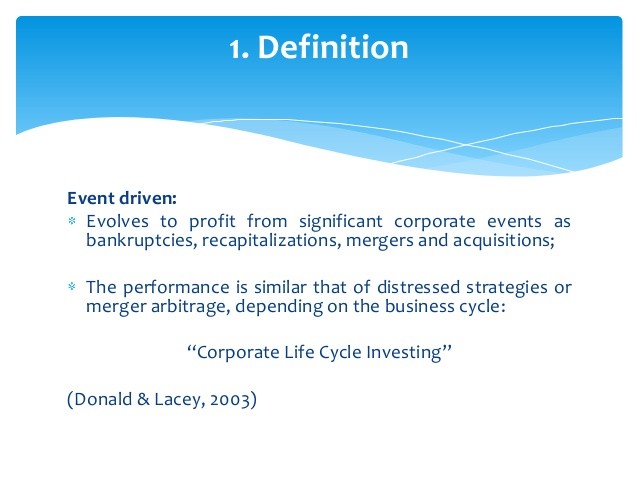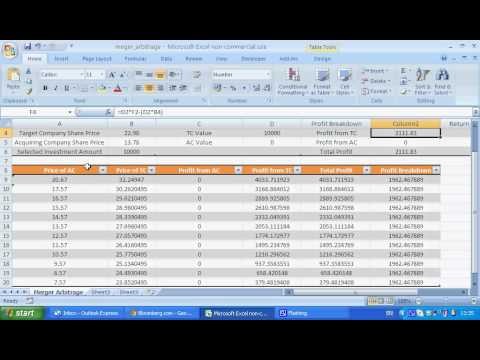How To Profit From Mergers And Acquisitions Through Arbitrage
Post on: 6 Июнь, 2015 No Comment

ArbitrageView.com intends to identify and track the profit opportunities on pending merger and acquisition deals in the U.S. markets.
Merger Arbitrage
Merger arbitrage, also called Risk Arbitrage is one of the most popular hedge fund strategies. It involves buying the stock of the company being acquired (“the target”) while selling short the stock of the acquiring company (“acquirer”). Normally the acquirer will offer a premium in order to purchase the target company. After a merger deal is announced, the price of the target company usually moves substantially higher to reflect the premium in value being paid by the acquiring company. Despite this increase, the target’s stock may still trade at a relative discount to the final merger value. The discount spread is the profit opportunity which the risk arbitrageurs attempt to capture.
Risks
It is important to note that merger arbitrage is not a complete risk free strategy. Profiting on the discount spread may look like the closest thing to a free lunch on Wall Street, however there are number of risks such as the probability of a deal failing, shareholders voting down a deal, revising the terms of the merger, potential lawsuits etc. In addition the trading discount captures the time value of money for the period between the announcement and the closing of the deal. Again the arbitrageurs face the risk of a deal being prolonged and achieving smaller rate of return on an annualized basis.
The size of the arbitrage spread is usually a good indicator of the probability of success assigned by the market participants for each deal. A deal that is perceived as riskier will trade at a bigger discount compared to other deals, therefore offers better returns for the traders willing to take the risk. The arbitrage spreads will change with time and as new information become available. As the closing date of the merger approaches, the spread should eventually converge to zero.
Diversification
One of the best ways to reduce the risk in merger arbitrage is to participate in multiple deals simultaneously. Diversifying across several deals without being overweight in any particular one will ensure that if one of the deals fails it will have only limited impact on the portfolio as a whole.
Cash Merger
There are three main types of mergers — cash merger, stock merger and combination of both cash and stock merger.
Perhaps the easiest merger type to understand and calculate is the cash merger. Here is one example: Company A is buying Company T for $20 a share. After the announcement, the stock of company T trades at $18 per share, therefore the arbitrage spread is $2 or 11.1%. Let’s assume this deal is scheduled to close in 6 months. This trade will yield 23% on annualized basis. In this scenario the arbitrageur will simply borrow at a rate lower than 23% and purchase the stock of company T.
Stock Merger
Stock mergers are usually more complex. In general the Acquirer will offer some of their shares in exchange for the shares of the Target Company. For example the acquirer will offers 0.5 shares of A for each share of the target T. If A is trading at $40, the merger value they are offering is 0.5*40= $20 per share. The main catch here is that the implied value of the merger becomes a function of the stock price of the acquirer. If the Acquirer trades at $30 by the closing date of the deal, the value of the deal is only $15.
The trading strategy in stock merger scenario will be to purchase the Target and sell short the Acquirer using the merger ratio. In this example it would a long position of 100 shares in stock T and a short position of 50 shares in stock A. By doing this the trader will be locking in the arbitrage spread. Regardless of which direction the price of the Acquirer goes one side of this trade will loose and the other side will profit. The ultimate profit will be at the time the spread converges to zero.
Stock and Cash Merger

In this type of merger the Acquirer offers a combination of the 2 scenarios already mentioned. To continue the example from above the Acquirer may want to pay $10 per share in cash and .25 share of A for each share of T. Again the merger value will be $20 = $10 + 0.25*$40.
A hedge trader will have to consider that the ratio here is 0.25 and assume the appropriate short position
Research and Analysis
It is essential for any hedge trader to perform thorough research before entering into a risk arbitrage position. Every deal is unique. In addition to the 3 types of mergers listed here, there may be additional conditions and rules which may alter the calculations. The best source of information for each deal is the press release issued by the companies.
This material is for informational purposes only and should not be construed as an offer or solicitation of an offer to buy or sell securities. At anytime AV’s affiliates may maintain long or short positions in the securities listed in this report. The information contained in the report is not guaranteed by ArbitrageView.com to be accurate and should not considered to be all-inclusive.
Keywords:
arbitrage, arbitrage inside secret skewness volatility, arbitrage convertible hedging insight successful technique, sports arbitrage, risk arbitrage, arbitrage sports betting, arbitrage continuous in theory time, convertible arbitrage, arbitrage trading, arbitrage sports betting services, complete arbitrage deskbook. arbitrage pricing theory. arbitrage finance mathematics springer. inside volatility arbitrage. statistical arbitrage. arbitrage guide investor risk. arbitrage forex, triangular arbitrage, arbitrage trading tracker software, adsense arbitrage, fixed income arbitrage, arbitrage continuous theory time, arbitrage finance financial guide market series wiley, currency arbitrage, an arbitrage guide to financial market, arbitrage capturing cd hedging pair profits risk statistical strategy trading, arbitrage continuous finance in oxford s theory time, arbitrage theory, tax arbitrage, arbitrage software trading, arbitrage betting. arbitrage international, analytical arbitragedeal, finance, financial, mergers and acquisitions, MAs, MA, mergers, acquisitions, private equity, venture capital, bankruptcy, IPOs, laws, regulations, deal makers, corporate restructuring, private equity, funds, Wall Street, bankruptcies, legal, tax, corporate, news, technology, arbitrage, tech, metrics, business, executive, Wall Street, MA, MAs, equity, deal, deals, policy,














